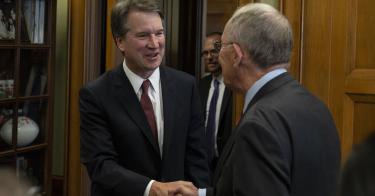Judge Brett Kavanaugh, President Trump’s nominee for the Supreme Court, is bracing to run the Senate confirmation gantlet. Some of his opponents have tried to present Kavanaugh as a problem for anti-Yucca Nevada lawmakers, particularly Sen. Dean Heller, whose seat is vulnerable in November.
Competing for Heller’s seat, Democratic Rep. Jacky Rosen has embraced this narrative to differentiate her opposition from Heller’s by pitching Kavanaugh’s opinion as a “pro-Yucca ruling” worthy of concern.
At the outset, it’s important to note that judges aren’t supposed to take sides on policy questions. They’re not meant to be pro or con anything. Their job is solely to interpret the law and Constitution without putting a thumb on the scale for one side or the other. And that’s exactly what Kavanaugh’s record as a judge shows — he’s fair, independent and faithful to the Constitution.
Kavanaugh’s supposedly “pro-Yucca ruling” aptly illustrates this. Consequently, it’s worth reviewing exactly what that case was about.
In August 2013, the U.S. Court of Appeals for the District of Columbia issued a decision requiring the Nuclear Regulatory Commission to restart its review of the license application for a nuclear waste repository at Yucca Mountain.
The Nuclear Waste Policy Act, as amended, had designated Yucca Mountain as the location for a national repository for nuclear waste. However, in 2010, President Barack Obama decided to stop executing the law and ordered the NRC to end its review of the Yucca Mountain project.
The administration lacked any scientific basis for its announcement that Yucca Mountain was “not a workable option.” But that decision had tremendous consequences: It left the nuclear industry in a debilitating holding pattern and taxpayers on the hook for billions of dollars in legal damages — a liability that continues to grow today.
The Heritage Foundation consistently made the case that President Obama needed to follow the law and require the NRC to finish its review of the Yucca Mountain project. And the D.C. Circuit agreed, in an opinion written by Kavanaugh. Here’s what he said:
“This case raises significant questions about the scope of the executive’s authority to disregard federal statutes. … The underlying policy debate is not our concern. The policy is for Congress and the president to establish as they see fit in enacting statutes, and for the president and subordinate executive agencies (as well as relevant independent agencies such as the Nuclear Regulatory Commission) to implement within statutory boundaries.”
Kavanaugh explained that the Constitution and Supreme Court precedents make clear that the president and independent agencies such as the NRC “may not decline to follow a statutory mandate or prohibition simply because of policy objections.” He concluded, “It is no overstatement to say that our constitutional system of separation of powers would be significantly altered if we were to allow executive and independent agencies to disregard federal law.”
A faithful reading of that opinion leads to a conclusion far different than that of Rep. Rosen and others, who have tried to frame it as a “pro-Yucca ruling.” Kavanaugh merely upheld the law that Congress passed. Here, Kavanaugh defended the constitutional responsibilities of Congress to legislate and the office of the president to faithfully execute the people’s will — neither is off the hook.
“Unless and until Congress authoritatively says otherwise or there are no appropriated funds remaining,” Kavanaugh wrote, “the Nuclear Regulatory Commission must promptly continue with the legally mandated licensing process.”
“Unless and until” is no threat, nor is it an exercise in judicial activism. It simply makes clear that the president must fulfill his constitutional role to enforce the law, and Congress may exercise its constitutional role to change the law if it is unsatisfied with the policy. The burden of policymaking is on Congress, not on judges such as Brett Kavanaugh.
This piece originally appeared in The Las Vegas Review Journal



